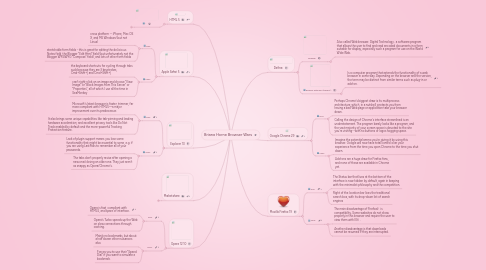
1. Define:
1.1. Browser:
1.1.1. Also called Web browser. Digital Technology . a software program that allows the user to find and read encoded documents in a form suitable for display, especially such a program for use on the World Wide Web.
1.2. Browser Extension (plugins) :
1.2.1. Is a computer program that extends the functionality of a web browser in some way. Depending on the browser and the version, the term may be distinct from similar terms such as plug-in or add-on.
2. Google Chrome 29
2.1. Pros:
2.1.1. Perhaps Chrome's biggest draw is its multiprocess architecture, which, in a nutshell, protects you from having a bad Web page or application take your browser down.
2.1.2. Calling the design of Chrome's interface streamlined is an understatement. The program barely looks like a program, and the vast majority of your screen space is devoted to the site you're visiting--with no buttons or logos hogging space.
2.2. Cons:
2.2.1. Imagine the potential ammo you're giving it by using this browser. Google will now have total control over your experience from the time you open Chrome to the time you shut down.
2.2.2. Add-ons are a huge draw for Firefox fans, and none of these are available in Chrome yet.
3. Mozilla Firefox 19
3.1. Pros:
3.1.1. The Status bar that lives at the bottom of the interface is now hidden by default, again in keeping with the minimalist philosophy and the competition.
3.1.2. Right of the location bar lives the traditional search box, with its drop-down list of search engines
3.2. Cons:
3.2.1. The main disadvantage of Firefox® is compatibility. Some websites do not show properly in this browser and require the user to view them with IE®.
3.2.2. Another disadvantage is that downloads cannot be resumed if they are interrupted.
4. HTML 5
4.1. ..
4.1.1. 1
4.1.2. 2
5. Apple Safari 5
5.1. Pros:
5.1.1. cross platform -- iPhone, Mac OS X, and MS Windows (but not Linux)
5.1.2. stretchable form fields - this is great for editing the del.icio.us Notes field, the Blogger "Edit Html" field (but unfortunately not the Blogger WYSIWYG "Compose" field), and lots of other form fields
5.2. Cons:
5.2.1. the keyboard shortcuts for cycling through tabs suck because they are 3 keystrokes, Cmd+Shift+] and Cmd+Shift+[
5.2.2. can't right-click on an image and choose "View Image" or "Block Images from This Server" or "Properties", all of which I use all the time in SeaMonkey
6. Explorer 10
6.1. Pros:
6.1.1. Microsoft's latest browser is faster, trimmer, far more compliant with HTML5—a major improvement over its predecessor.
6.1.2. It also brings some unique capabilities like tab-pinning and leading hardware acceleration, and excellent privacy tools like Do Not Track enabled by default and the more-powerful Tracking Protection feature.
6.2. Cons:
6.2.1. Lack of plugin support means you lose some functionality that might be essential to some, e.g. if you are using LastPass to remember all of your passwords.
6.2.2. The tabs don't properly resise after opening a new one/closing an older one. They just aren't as snappy as Opera/Chrome's.
7. Marketshare
7.1. 1
8. Opera 12 10
8.1. Pros:
8.1.1. Opera is fast, compliant with HTML5, and spare of interface.
8.1.2. Opera's Turbo speeds up the Web on slow connections through caching.
8.2. Cons:
8.2.1. Mainly no bookmarks, but about a half dozen other nuisances also.
8.2.2. Forces you to use their "Speed Dial" if you want to simulate a bookmark.

